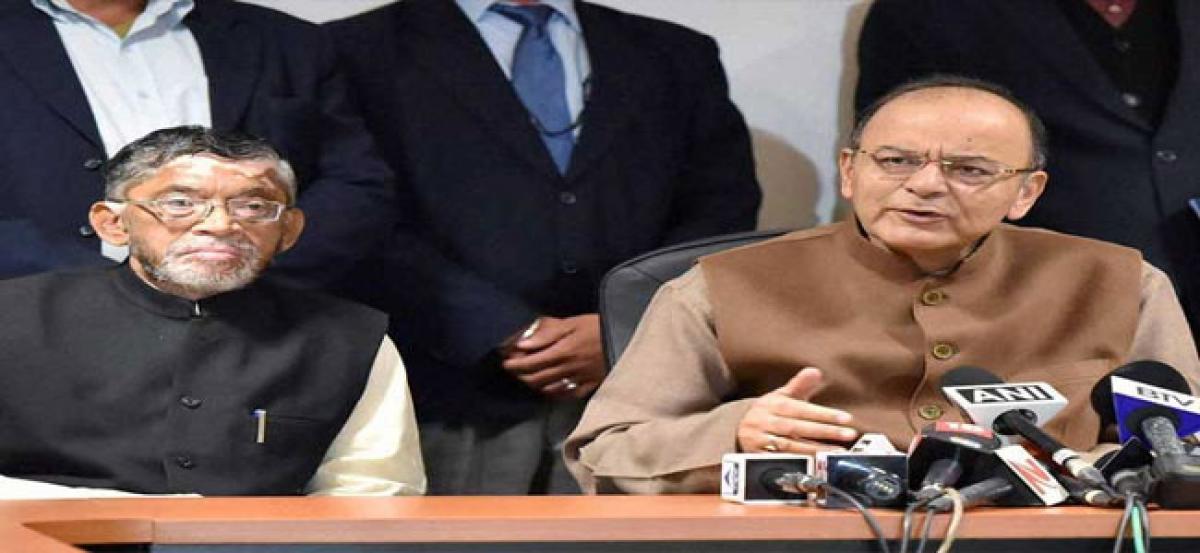Live
- People’s Planet launched by BDA Chairman
- Paresh Rawal, Hema Malini, Rakesh Roshan cast their votes for Maharashtra elections
- Bengal Police solves horrific murder of schoolteacher
- Cryptocurrency fraud: Sharad Pawar slams BJP for naming his daughter
- Vehicle checks should be carried out at State border: Collector
- Country’s progress depends on women empowerment: Bhatti
- Aryan Khan's Debut OTT Series Stardom Set to Feature Cameos from Shah Rukh Khan, Karan Johar & More
- Voting a precious privilege, all must exercise: Tata Sons Chairman
- Lionel Messi to play international friendly match in Kerala in 2025
- J'khand records 31.37 pc voter turnout, polling officer in Deoghar removed over 'bias'
Just In

India will turn into one market at the stroke of mid-night between June 30 and July 1, with the rollout of the unified GST along with liberal tax filing rules for first two months to tide over any teething issues.
New tax regime roll out on July 1 and Lottery, hospitality tax rates finalised
New Delhi : India will turn into one market at the stroke of mid-night between June 30 and July 1, with the rollout of the unified GST along with liberal tax filing rules for first two months to tide over any teething issues.
Highlights:
• GST launch on the midnight of June 30 and July 1st
• Relaxation in Return filing time-line for first 2 months
• GSTR-1 needs to be filed for July by Sept 5, and for August Sept 20. GSTR-2 and GSTR-3 for these 2 months will be filed thereafter
• 28% limit in hotels will start from Rs 7,500; between Rs 2,500- Rs 7,500 the rate will be 18%
• GST on restaurants in these hotels will be at par with other air-conditioned restaurants (18%)
• State-run lotteries will be taxed at 12% of the face value and state authorised lotteries at 28%
• GST Council cleared 6 rules, including anti profiteering. An anti-profiteering body will also be setup for 2 years
• More consultations on e-way bills, till then an alternative or transient rule will prevail
• Traders to get relaxation on filing of returns
• IGST rate of 5% on ship with full ITC will be applicable
Rejecting demands for deferment of the biggest tax reform since Independence, Union Finance Minister Arun Jaitley assured the nation that the IT network backbone has been adequately tested and systems are in place for implementation of the goods and services tax.
The Goods and Services Tax Council at a meeting on Sunday finalised two rates for lottery and also gave a partial relief to five-star hotels and their restaurants.While sticking to the rollout date of July 1 for GST, Jaitley announced relaxations for return filing by trade and industry for the first two months. “This will give the GST Suvidha Providers and assessees sufficient time to prepare their systems,” he said.
Accordingly, for July, assessees will have to self declare and pay the GST through Form 3B by August 20 and for August by September 20.While they will have to upload invoice-wise data on the GST common portal, the deadline for July has now pushed back to September 5 and for August to September 20. “No late fees or penalty would be levied,” an official release said.
Based on the recommendation of Goa and Rajasthan, the GST Council has increased the tariff threshold for the 28 per cent tax to Rs 7,500 per night from the proposed Rs 5,000, at present.
This would mean that an 18 per cent GST will be levied on bills of Rs 2,500 to Rs 7,500. “Similarly, AC restaurants in these hotels would also be taxed at 18 per cent,” Jaitley said after the meeting. The Council also decided to tax lotteries run by state governments at 12 per cent of the face value and those run by private players but authorised by the States at 28 per cent.
It retained the maximum turnover for the composition scheme to Rs 50 lakh for North East States and Himachal Pradesh. For all other States, including Uttarakhand and Jammu and Kashmir, it has been kept at Rs 75 lakh.Manufacturers of ice creams, pan masalas and tobacco have been excluded from the composition scheme. The Council also decided to defer the implementation of the e-way bill for some time due to a lack of consensus but plans to give full shape to the anti-profiteering authority (APA) by the month-end.
The Council will meet once again on June 30. The Council also approved rules relating to advance ruling, appeals and revision, assessment and anti-profiteering. “We want to keep it as a deterrent and hope we are not compelled to use the APA,” the Finance Minister said.
Revenue Secretary Hasmukh Adhia said the rules will be notified by Monday. According to the mechanism, a Standing Committee of officers will review the complaints which will then be investigated by the Directorate General of Safeguards.
If found genuine, it will forward the complaint to the APA, which can ask the company to roll-back the price and also refund an amount equal to what it has made through the hike in prices. “It will have a sunset clause of two years,” Adhia said.

© 2024 Hyderabad Media House Limited/The Hans India. All rights reserved. Powered by hocalwire.com







